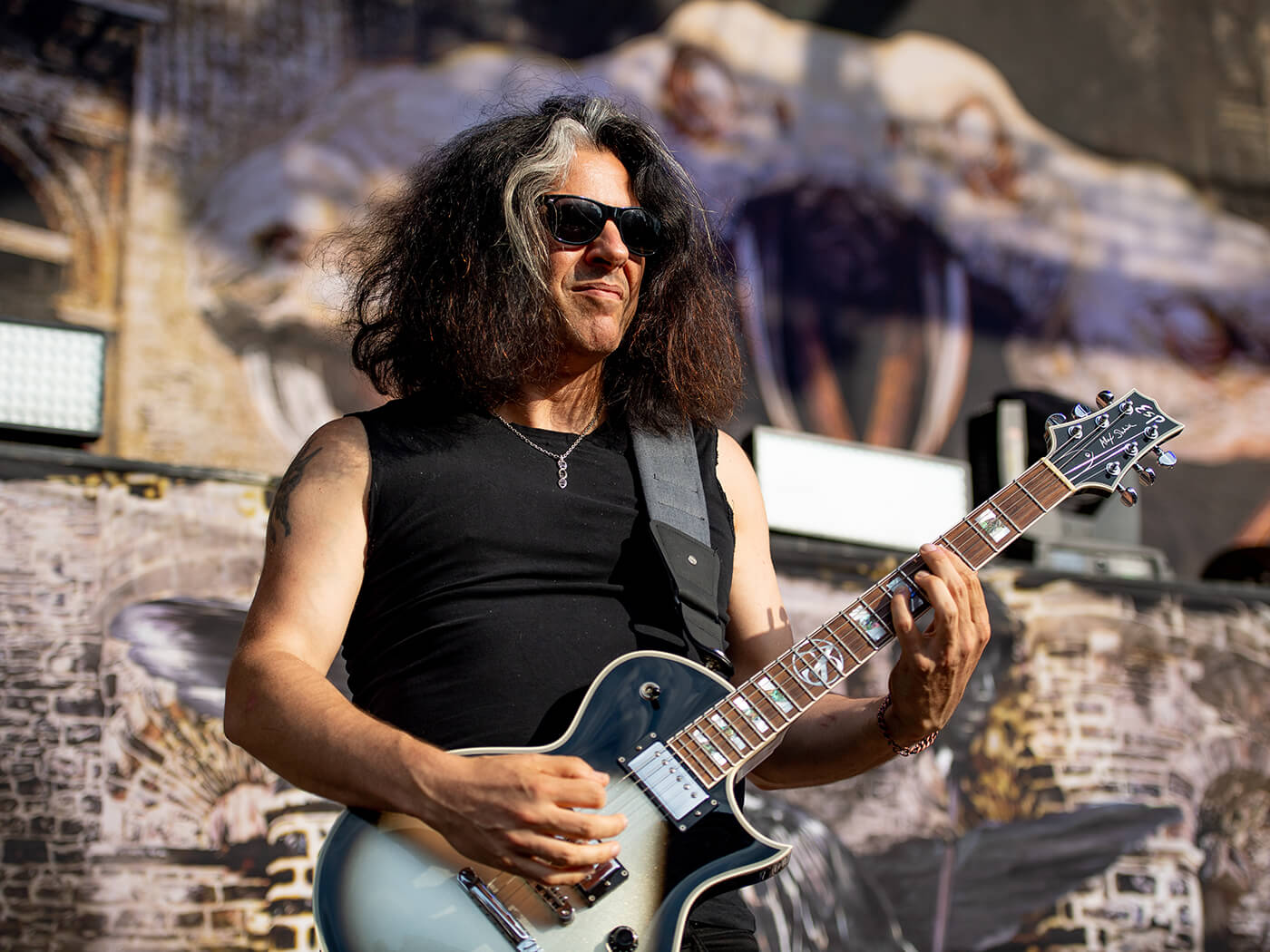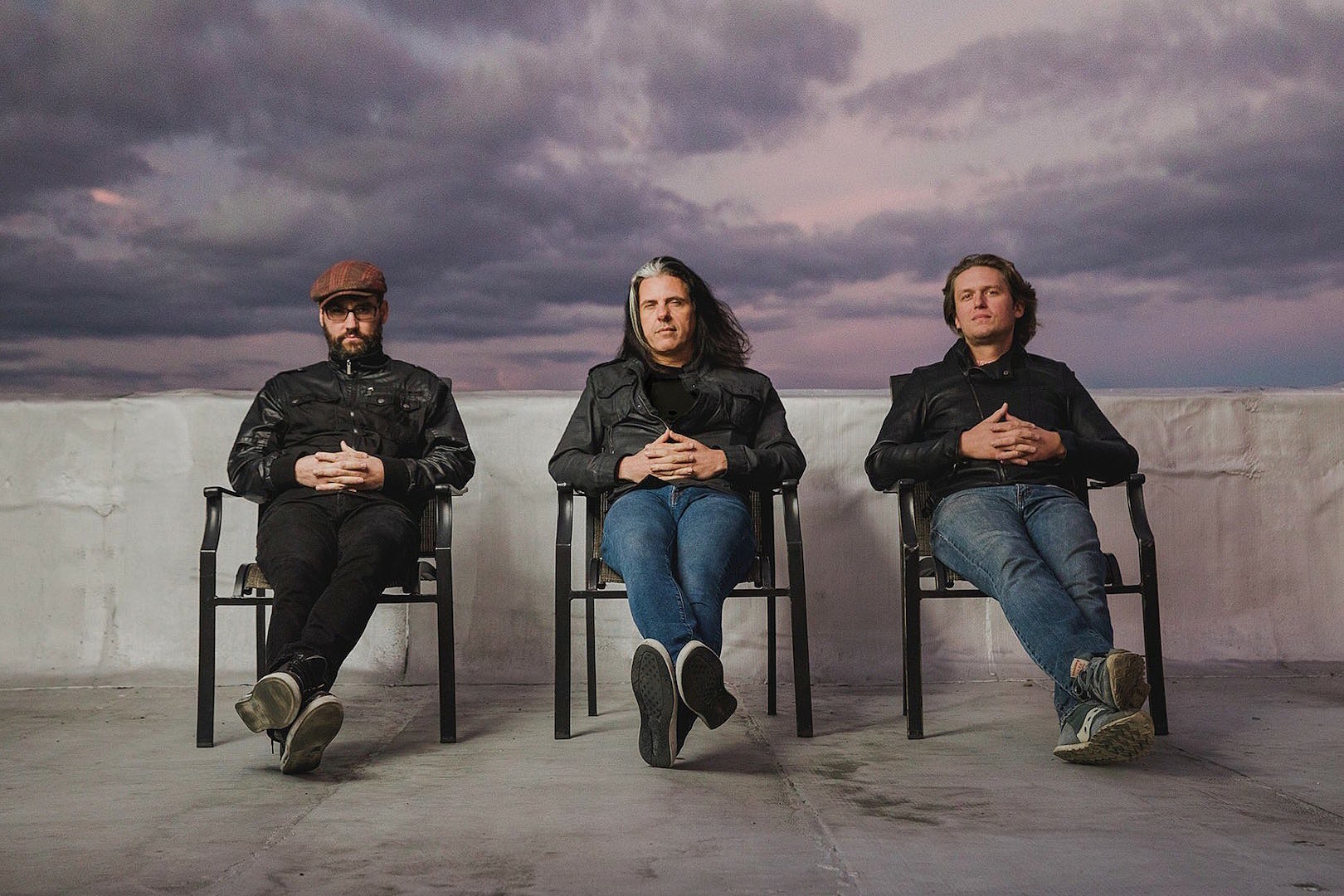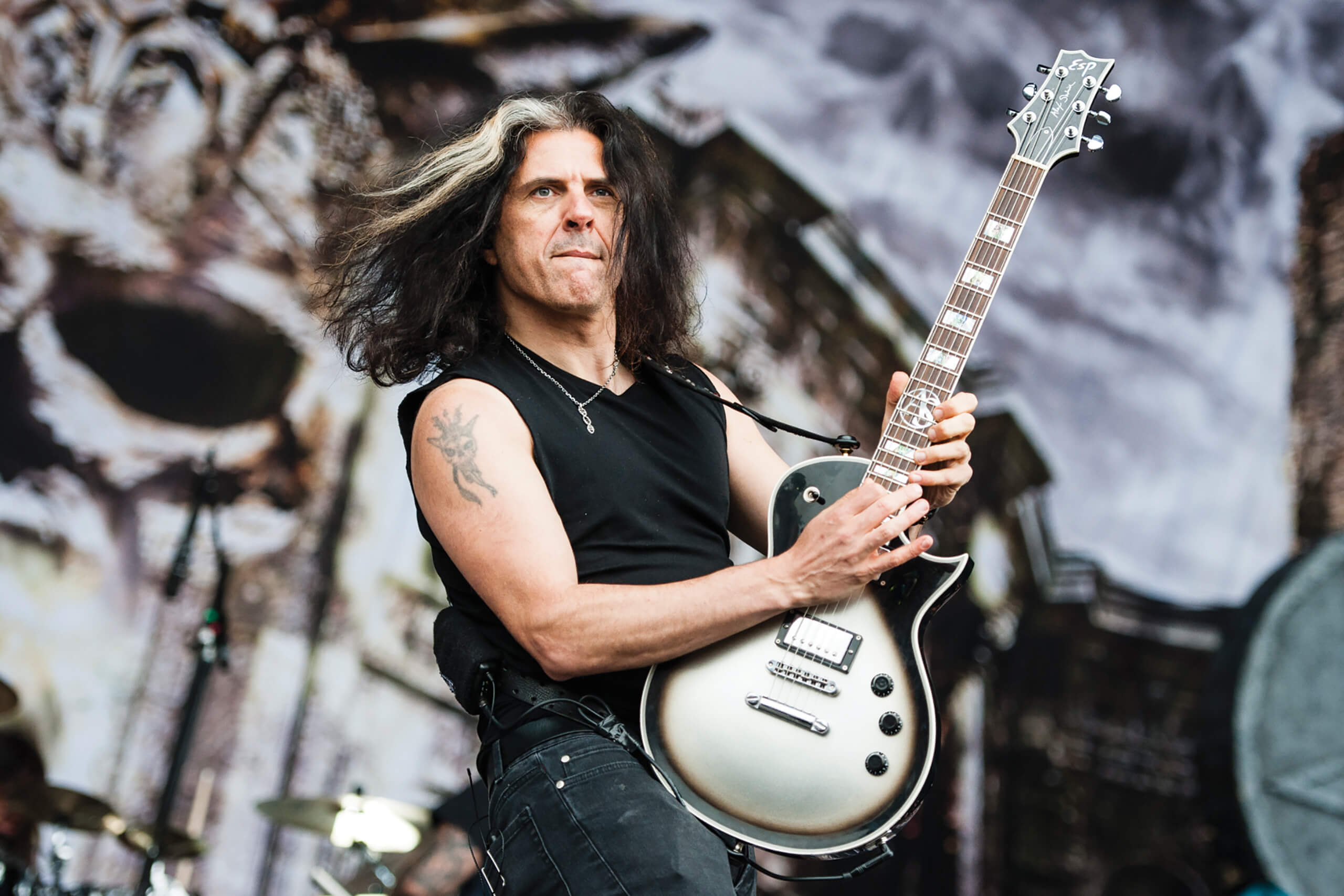All images courtesy of Adrenaline PR

Some artists are restless. They refuse to stagnate. They’re ever-evolving and always growing. Guitarist Alex Skolnick is one of those artists.
Most know Alex through his furious work with the Heavy Metal band, Testament. Testament, like so many others from the era of 80’s Thrash Metal, is supremely underrated, and Alex’s work with the group was and is a huge part of their success, and legacy.
Never one to settle, Alex went on to become a fantastic Jazz guitarist to boot, and through his work with his trio, Alex has made a lasting impact on Jazz in the same manner that he has on Heavy Metal.
Today, I “sit down” with Alex Skolnick. It’s not often that one gets the chance to “speak” with one of the better guitarists of a generation, so this was a real treat for me. As is the case with his guitar playing, this chat with Alex is thoughtful, insightful, and fun. What more can you ask for?
If you would like to learn more about Alex’s work with Testament, you can head over to their website here. They’ve got a new album out. It’s called Titans of Creation, and I highly recommend it. You can grab a copy here.
If you would like to learn more about Alex’s work as a Jazz artist, then you can head over to the Alex Skolnick Trio’s website here. Lastly, don’t forget about Alex’s new podcast, Moods & Modes. You can download it wherever you get your podcasts, but here is the link for Apple users and one for Droid users here. That said- enjoy this one. I know I did.
Andrew:
Alex, thank you for taking the time to speak with us. It’s been a weird year, hasn’t it? What have you been doing to pass the time?
Alex:
My pleasure. It’s certainly been an interesting year. I’ve managed to keep very busy despite the cut-down and travel. I started a podcast (Moods & Modes) and it’s picked up fast, it’s even part of the Osiris media network now. I launched a Patreon account where I have exclusive guitar tutorials and fan content. I’ve also done many public videos- everything from quarantine jams, including one of the very first popular ones “YYZ” by Rush, plus product demos. I’ve gotten much better at recording at home and filled a lot of gaps in my technical knowledge. I got deeper into my photography with pictures of New York City during the shutdown and the social justice protests during the Summer. I’ve also been working on a method book that’s coming out next year through Hal Leonard. So, it’s been a bit different but productive, and not boring.
Andrew:
Tell us a bit about your backstory. What are your musical origins?
Alex:
I’m from Berkeley California. I come from an academic family without much music as part of the family, other than an older brother who played in a few local bands, but the older I got the more I appreciated music and thought to try playing. The 50s became popular, and I was growing up with shows like Happy Days and movies like American Hot Wax. So, I really liked early Rock ‘N’ Roll, especially Chuck Berry and Jerry Lee Lewis as a young kid. I was also a big Beatles fan and am still.
Andrew:
What inspired you to pick up the guitar? Who are some of your favorite players? Ones that had the most influence on you.
Alex:
I was 10 when I decided to play guitar. I’d already been a fan of The Beatles and Chuck Berry but by then I discovered KISS, and I really wanted to learn their songs. Then became more serious a few years later when I heard Van Halen for the first time as well as Ozzy Osbourne‘s first records under his name with Randy Rhoads on guitar. They were my first Rock influences. Since then, I have had many favorite guitarists including Jeff Beck, Jimi Hendrix, George Benson, Pat Metheny, and John Scofield…too many to name.
Andrew:
As a guitarist, you’ve got a great tone and an excellent feel for the song. How did you develop your signature style?
Alex:
I’ve never consciously tried to develop a style. What I do try to do is fit whatever song I’m playing over. I also borrow favorite bits and pieces from some of the players who influence me, but I try to make them not too obvious. I think that when you bring different influences together and then don’t think too much about them, it helps to create an original sound. Of course, it takes many years of experience to get to this point.
Andrew:
You’re one of the original members of Thrash Metal band, Testament. For our readers that don’t know, how did the band get started?
Alex:
The band had already formed by the time I joined. So, while you could say an “original member,” I’m not a founding member. I was in high school and they were one of the bands that were supporting some of the newer bands that my friends were excited about such as Slayer and Megadeth who were just playing in Northern California for the first time. The band was formed by guitarist Eric Peterson. We were recording our first album only two years after I joined the band and things happened very fast.
Andrew:
Let’s talk a little bit about the Thrash scene in the 1980s. The Bay Area in particular was a hotbed of talent in regards to Metal. What was it like coming up around that time, in that area?
Alex:
It was an exciting time. I just happened to find myself in this group of friends that enjoyed going to these high-energy shows, and there were many local bands. Metallica was already touring the world at that point, but they had relocated from Southern California to the Bay Area which gave the scene a big boost. For every Metallica, Megadeth, and Slayer show, there would be a need for support acts. So, this whole second and third tier of groups built up under them and they were playing as well. It seemed like there was a constant stream of heavy shows going on at that time.
Andrew:
The Big Four always get all the attention, but bands like Testament, Exodus, and Anvil deserve as much credit as any Thrash band from back then. What are your thoughts on that?
Alex:
I understand the sentiment when people say that the categorization of the Big Four should be more inclusive, but I also feel that these bands were there first and it makes sense to group them that way simply out of seniority. It would be nicer if the next wave of bands got more attention. But in general, Metal seems to get a lot less attention anyway and it’s not worth the energy of dwelling on it.
Andrew:
After you left Testament in the early 90s, you went on to do a lot of excellent freelance work with Ozzy Osbourne, Lamb of God, and others. I’ve heard that freelance work can be less restrictive. How did you enjoy working as a freelancer as opposed to working within the confines of a band?
Alex:
For me, being a freelance musician, both on the stage and in the studio, was an incredible learning experience. Being in one band can feel like a bubble. I had only been in one band up to that point. So, to see what it’s like working with different types of musicians and different personalities, and learning to adjust to different situations as well as playing a more supportive role, rather than being a featured band manner, was invaluable and made me a far better, more diverse artist.
Andrew:
In the late 90s, you reinvented yourself as a Jazz guitarist. What lead you toward making that decision. How has your work as a Jazz guitarist informed your continued work as a Metal musician, if at all?
Alex:
I had several experiences that jumpstarted me into playing Jazz guitar. I had just started to feel creatively restless after a year of touring and recording my second Thrash Metal album. Almost like clockwork, these experiences happened within the span of a few months. One was discovering the music of Miles Davis in the 80s. His various bands at that time included guitarists such as John Scofield, Mike Stern, and Robben Ford. It was high-energy music that blended Funk, Blues, and Pop. To be honest, it didn’t even strike me as Jazz. But it was so inspiring, that I tried to learn it. I soon realized I needed the help of music teachers. I found some local advanced musicians who made it clear that all of those musicians have very strong backgrounds in Jazz, with the skills to play acoustic bass and piano even though they are also proficient in electric music. So, I began developing a repertoire of Jazz standards and learning to play straight-ahead Jazz guitar. At first, it was out of necessity, but the more I did it, the more I enjoyed playing more traditional Jazz and as time went on, I got more and more into it. There were several other important experiences as well but in the interest of time, I’ll just mention one: A short time after I was on this Jazz journey, I found myself in the studio recording the next Testament album. This studio turned out to be Fantasy Studios which was partnered with a Jazz record label. They were in the process of re-mastering many long out-of-print Jazz records for release on CD. At one point, I heard a live John Coltrane album being remastered. It really sounded like he was in the room and with some of the most inspiring music I’ve ever heard. As a friend and client of the studios I ended up receiving hundreds of promotional CDs that I’m grateful for, and this launched my Jazz album collecting. I still have them all to this day including that one, Coltrane’s Live at Birdland.

Andrew:
In 2005, you returned to Testament full time. What led to you returning to the band?
Alex:
You could say I caused a stir when I left Testament. But by 2005, I was already deep into recording and touring with my trio and working with other instrumental artists. The last thing anybody expected me to do was to re-join Testament. It caused a stir when I re-joined. I suppose I enjoy causing a stir and not doing what is predicted, both in terms of my playing and my career choices. Also, by that time, the band had worked out a lot of issues and was in a better place personally. I felt comfortable having a balance between that side of my playing and the Jazz, Blues, and improvisational side, so it made sense. I’ve now been there twice as long as I was the first time around.
Andrew:
Let’s talk about current events. Testament has a new album out this year. It’s called Titans of Creation. Tell us more about the record? What was the inspiration? Where can we get the record and what formats will it be on?
Alex:
Every album is different. There are no plans beforehand, just all of us working on ideas and bringing them together when it’s time to record. Eric, being the founder of the band, and the one member who’s been there since day one, is the one who has to sign off on everything. But I’m thankful that a couple of whole songs that I brought in found their way onto the record. It’s available wherever you buy your music and all streaming platforms.
Andrew:
Aside from any potential possibilities musically, what else are you passionate about? How do those passions inform your music, if at all?
Alex:
I’ve become passionate about photography over the last few years, as I mentioned in the first question. I enjoy bringing my Leica camera all over and capturing images. I am also an avid reader and I’m always reading a book. I’m also a fan of great cinema although I don’t see as many movies as I would like to. I think all of these things inform my music and creativity in different ways, from triggering moods to inspiring subject matter.

Andrew:
Shifting gears now. In your opinion, COVID-19 aside, what’s the state of the industry? With the never-ending barrage of social media, and constant squeeze from big business, is it harder or easier for artists to succeed these days?
Alex:
I think the music industry was always uncertain and difficult to navigate. But in recent years, that has become even more the case. The structure keeps changing and once you get the hang of a certain way of doing things, it all shifts again. So, you have to be a little bit crazy to have a career in music, but if you have the passion required, then there’s nothing else you can do.
Andrew:
What are a few albums that mean the most to you and why?
Alex:
Miles Davis, Kind of Blue is an album I can listen to over and over; it always seems to create a better mood and inspires. The first Van Halen album is state-of-the-art guitar to me. It was when I first heard it and it still is to this day, which is a very rare thing you can say about an album. I would also add Pink Floyd, The Wall as an example of an incredible story, concept, and collection of great songs and guitar playing. The Beatles, Rubber Soul although any album they followed it up with is also on the list.
Andrew:
Are you into vinyl? Tapes? CDs? Or are you all digital now? Where do you like to shop for music?
Alex:
I am someone that likes vinyl and likes digital but in different situations. I got back into vinyl a few years ago once my trio began including vinyl as part of our releases. I enjoy it, especially for classic albums that were originally meant for vinyl. I think there’s nothing like hearing great Rock and Jazz albums from the 70s and earlier on vinyl. However, if I am hearing a digital recording of the London Symphony orchestra, for example, I would rather hear that on a digital file or a CD. I do a lot of my listening on Apple Music and it’s great for convenience. However, I also enjoy shopping for classic albums on vinyl. I liked tapes when I was much younger but now just appreciate them as collector’s items.

Andrew:
It’s been a weird year, but we’ve still seen a lot of great music released in 2020. What are some of your “must-have” albums of the year?
Alex:
I was never that familiar with Fiona Apple but I think her album that came out this year (Fetch the Bolt Cutters) is amazing. Norwegian guitarist Terje Rypdal is one of my favorite musicians and doesn’t release new music too often, but he has a brand new one (Conspiracy) that is as good as anything he’s done and he’s in his mid-70s. And I think the new ACϟDC album (Power Up) is a true gift. No one saw that coming, and it looked like they might be over, yet here’s a brand new classic that ranks up there with all their great works.
Andrew:
What type of guitars and gear are you using these days?
Alex:
I use different guitars and gear depending on the situation. I have some vintage guitars that I’ve acquired in the last few years including a 1968 SG, a 90s Gibson 347, and a recent Stratocaster relic that feels like an early 60s model. But when I tour, I use my signature Alex Skolnick model by ESP, which I also do a lot of my recording with. I also play Taylor acoustic guitars and Godin guitars with my Trio. Testament is using Kemper amps these days, which are very convenient and easy to travel with. For instrumental music, I tend to use Fender Vibroluxes and PV classic 50s. And I use some digital platforms including IK multimedia‘s Amplitube 5, which is very good.
Andrew:
Last question. You’ve had a great career, with hopefully a long way to go yet. That said, looking back, what are some of your proudest and fondest memories as a musician?
Alex:
There are many proud moments, but I think I take the most pride in having diversity and being able to sit in with a variety of artists. I’ve been a guest of Living Colour, Rodrigo Y Gabriela, Joe Satriani’s G3, and many more. Also, when my first trio album was the subject of a full-page article in Billboard magazine and climbed the Jazz radio charts, something no one myself included ever expected. So, I think being able to make a statement in Metal feels great, but it also feels great to not be limited by that.
Interested in sampling the music of Alex Skolnick with Testament? Check out the link below:
Dig this interview? Check out the full archives of Vinyl Writer Interviews, by Andrew Daly, here: www.vinylwritermusic.com/interviews
